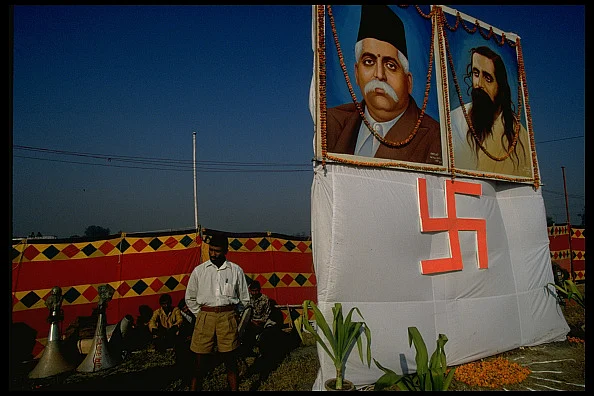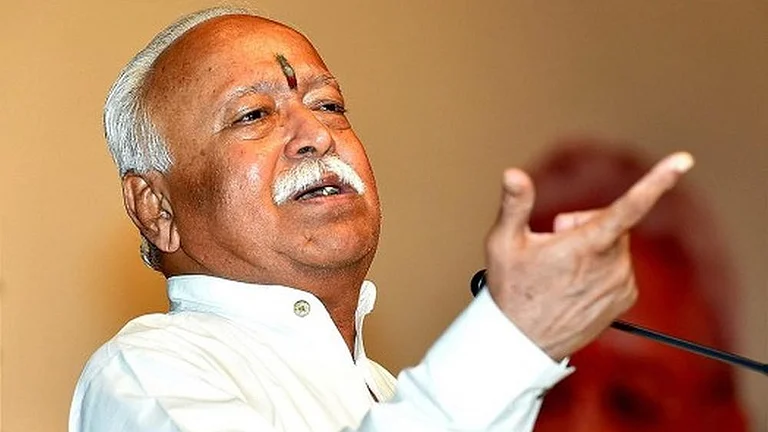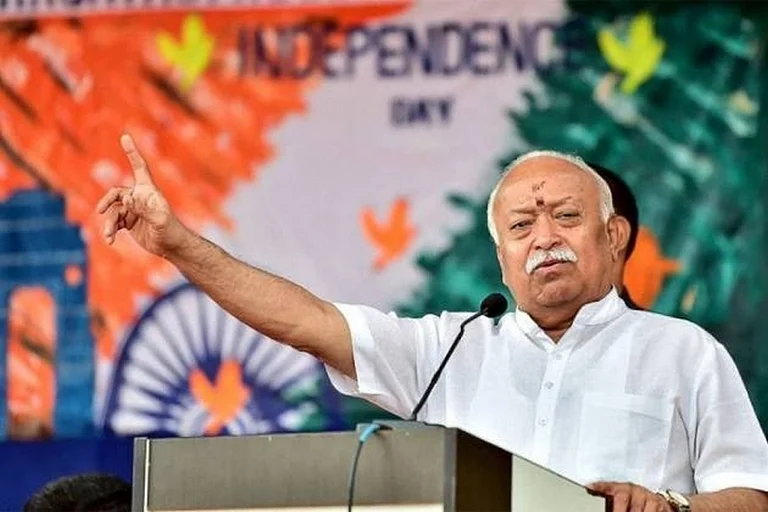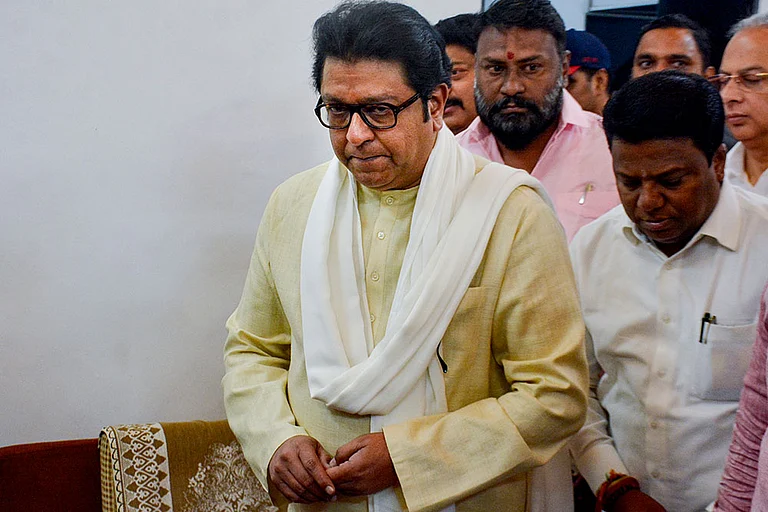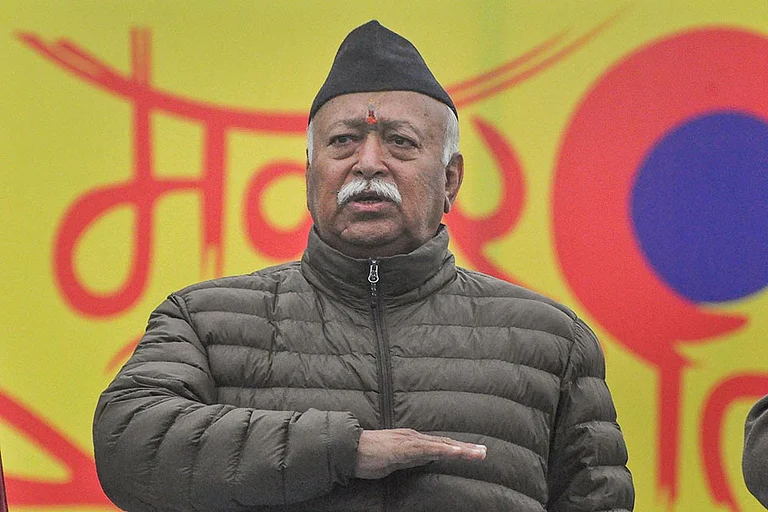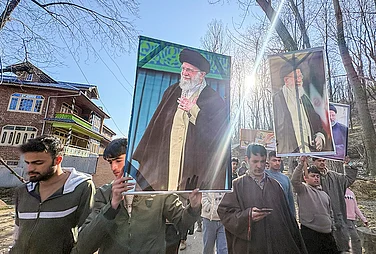In his first public address since the declaration of Lok Sabha 2024 election results, Rashtriya Swayamsevak Sangh (RSS) chief Mohan Bhagwat has given a call to move away from electoral rhetorics and instead focus the nation’s attention on burning issues like the Manipur conflict. In what is being seen as a rebuke to BJP leadership, the Sangh chief also said that a “true sevak” (one who serves the people) does not have “ahankar” (arrogance) and works without causing any hurt to others. Referring to the bitter poll campaign, he said “decorum was not maintained”. Urging the governmnet and the leaders in Opposition to work together, Bhagwat said that election is a process of building consensus. “Parliament has two sides so that both aspects of any question can be presented," the RSS chief said.
Bhagwat also brought up the issue of Manipur. "It's been a year since Manipur has been waiting for peace. The state remained peaceful for the last 10 years, but suddenly, gun culture has increased again. It is important to resolve the conflict as a priority. There is a need to get over election rhetoric and focus on problems facing the nation”.
The comments come as a surprise from the RSS, which has been known to not only be the ideological forefather of the BJP but also the provider of key support and cadres on ground to the party, even today.
What is the RSS?
The RSS is a socio-cultural and civil society organisation working for safeguarding Hindu culture and ethos. Founded on September 27, 1925 by Keshav Baliram Hedgewar, a doctor from Nagpur, Maharashtra who was inspired by the ideas of Hindutva and nationalism, the RSS espouses Hindutva, a nationalist ideology that emphasises the cultural and spiritual unity of India with Hinduism as its core. The RSS has been influential in Indian society, particularly in areas such as social service, education, and cultural activities. The organisation adopted a structured hierarchy and a distinctive uniform for its members, emphasising discipline and selfless service.
During the pre-independence era, in years between 1925-1947, the initial aim of the RSS was to promote the cultural and spiritual rejuvenation of India. In these early years, RSS expanded its activities, focusing on character building, social service, and organising youth, with a view to install nationalist ideals and a sense of pride in Indian culture and heritage. It played a significant role in various social reforms and relief work during natural calamities. However, it largely remained a fringe organisation during this period.
In the Post-Independence period (1947 onwards), the RSS faced challenges as it was seen with suspicion by the government due to its non-participation in the freedom struggle and its perceived Hindu nationalist ideology. In 1948, Nathuram Godse, who had earlier been associated with the RSS, assassinated Mahatma Gandhi, leading to a ban on the organisation. However, after an investigation, the ban was lifted, and the RSS distanced itself from the assassination.
Despite initial setbacks, the RSS continued to expand its network across India. It established various affiliates and sister organisations, including the Bharatiya Janata Party (BJP) in 1980, which has become one of the major political parties in India.
RSS and BJP
The BJP’s precursor Bharatiya Jana Sangha (BJS) founded by Shyama Prasad Mookherjee in 1951, laid the political and ideological foundation for BJP. Many leaders of the BJS had close ties with the RSS, and the party's ideology was deeply influenced by the RSS's principles of Hindutva and cultural nationalism.
While the BJS and the RSS were separate entities, there was considerable overlap in terms of membership, leadership, and ideological alignment. The RSS provided organisational support and ideological guidance to the BJS, helping it grow as a political force representing Hindu nationalist interests in India. The close association between the BJS and the RSS continued even after the BJS merged with other parties to form the Bharatiya Janata Party (BJP) in 1980. The BJP, which succeeded the BJS, maintained strong ties with the RSS, and many of its leaders and members had roots in the RSS cadre.
While the RSS’s ideology of Hindutva shaped the political philosophy of BJP, the organisation has also given the party some of its top leaders like Atal Bihari Vajpayee, Lal Krishna Advani, and Murli Manohar Joshi among others.
The RSS's ideological influence extended to various spheres of Indian society, including education, media, and cultural organisations. Since coming to power, the BJP has maintained close ties with RSS and continued to prioritise issues aligned with its ideological agenda. The RSS's grassroots network and organisational infrastructure provides crucial support to the BJP's electoral campaigns and governance initiatives. Its ideological influence is particularly evident in the policies and agendas of the BJP-led government at the centre and in several states.
Controversies and Criticisms
Over the years, the RSS has been embroiled in multiple controversies, primarily due to its Hindu nationalist ideology, which some perceive as divisive and exclusionary. Critics accuse the organisation of promoting religious majoritarianism and undermining India's secular fabric. The RSS's stance on issues related to minority rights, particularly those of Muslims and Christians, its opposition to interfaith marriages, its stance on women's rights and gender equality, and its aggressive advocacy for cow protection has drawn criticism from human rights organizations and advocacy groups in the past. Critics accuse the RSS of advocating policies that discriminate against minorities and undermine their rights. However, supporters argue that the RSS is committed to the cultural and spiritual upliftment of India and espouses a nationalist ethos that transcends religious boundaries. In recent years, the organisation has tried to increase’s outreach among minorities. In 2002, it formed the The Muslim Rashtriya Manch under then chief K S Sudarshan to grow dialogue with Muslim community.






